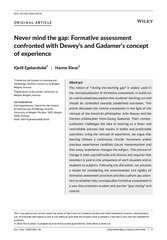| dc.contributor.author | Egelandsdal, Kjetil | |
| dc.contributor.author | Riese, Hanne | |
| dc.date.accessioned | 2020-08-10T08:49:03Z | |
| dc.date.available | 2020-08-10T08:49:03Z | |
| dc.date.issued | 2020 | |
| dc.Published | Egelandsdal K, Riese HRI. Never Mind the Gap: Formative Assessment Confronted with Dewey’s and Gadamer’s Concept of Experience. European Journal of Education. 2020;55(1):91-104 | eng |
| dc.identifier.issn | 0141-8211 | |
| dc.identifier.issn | 1465-3435 | |
| dc.identifier.uri | https://hdl.handle.net/1956/23600 | |
| dc.description.abstract | The notion of “closing the learning gap” is widely used in the conceptualisation of formative assessment. It builds on an unarticulated assumption that students' learning can and should be controlled towards predefined outcomes. This article discusses this control assumption in the light of the concept of the American philosopher John Dewey and the German philosopher Hans‐Georg Gadamer. Their conceptualisation challenges the idea of learning as a linear and controllable process that results in stable and predictable outcomes. Using the concept of experience, we argue that learning follows a continuous circular movement where previous experiences condition future interpretations and that every experience changes the subject. This process of change is both unpredictable and diverse and requires that attention is paid to the uniqueness of each situation and to students as subjects. Following the discussion, we propose a model for considering the extensiveness and rigidity of formative assessment practices and that authors pay attention to whether they conceptualise formative assessment in a way that promotes student and teacher “gap closing” and control. | en_US |
| dc.language.iso | eng | eng |
| dc.publisher | Wiley | eng |
| dc.rights | Attribution-NonCommercial CC BY-NC | eng |
| dc.rights.uri | http://creativecommons.org/licenses/by-nc/4.0/ | eng |
| dc.title | Never Mind the Gap: Formative Assessment Confronted with Dewey’s and Gadamer’s Concept of Experience | eng |
| dc.type | Peer reviewed | |
| dc.type | Journal article | |
| dc.date.updated | 2020-01-17T09:46:54Z | |
| dc.description.version | publishedVersion | |
| dc.rights.holder | Copyright 2020 The Author(s) | eng |
| dc.identifier.doi | https://doi.org/10.1111/ejed.12378 | |
| dc.identifier.cristin | 1686772 | |
| dc.source.journal | European Journal of Education | |

